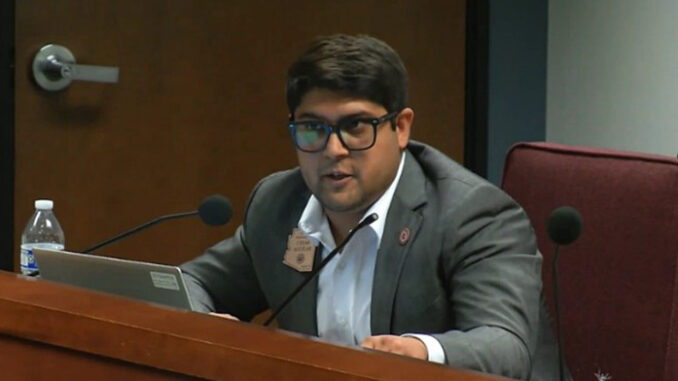
On Tuesday, Arizona State Rep. Cesar Aguilar argued against free speech claiming “free speech gets very dangerous” during a hearing House Ad Hoc Committee On Oversight, Accountability And Big Tech.
Aguilar made the comment during testimony from James Kerwin, senior counsel for Mountain States Legal Foundation. Kerwin, who delivered his testimony in a quiet and matter-of-fact manner, could not hide his shock in response to Aguilar’s claim.
“I am not hearing you describe a situation where there is something that is clearly true or clearly false and this is exactly the context in which it is dangerous to say, as I believe you just did, that free-speech can be dangerous,” said Kerwin responding to Aguilar.
“I was disappointed to hear that some of my colleagues on the left view free speech as dangerous, said Committee Chair Rep. Alex Kolodin. “As I see it, government exists only to to protect our fundamental liberties. So long as we have Republican majorities in the legislature, I am confident that will remain the prevailing view. Those who don’t want to be shut up need to speak out, show up, and vote.”
“In the heart of our democracy, the core of our Republic, the First Amendment stands as the guardian of liberty. It’s not just a parchment promise; it’s the lifeblood of our nation,” said Sergio Arellano, an Army veteran and candidate for Arizona State House Legislative District 2. “We must fiercely defend the right of every American to speak their mind, for it is through free speech that we preserve our values, challenge the status quo, and ensure the enduring strength of our great nation. I have faced danger on the battlefield, words do not present a threat.”
A number of bombshells were dropped during the hearing, including the fact that Google will face a Federal Elections Commission (FEC) complaint in the coming months for alleged manipulation of elections through its search engine.
Psychologist and researcher Robert Epstein announced his intent to file the complaint during the hearing on Tuesday. Based on his decade of research and experiments, Epstein alleged that Google has effectively controlled elections through personalized and targeted manipulations of search results and voting encouragements that he says have swayed tens of millions of undecided voters to vote Democratic.
“We don’t even need to hold elections anymore,” said Epstein. “They [Google] can tell us to a high degree of certainty how many people are going to vote, how they’re going to vote, and who’s going to win.”
By the end of September, Epstein said his team would be filing an unprecedented FEC complaint against Google. Epstein alleged that Google’s SEME practices violate FEC regulations by sending out messages in partisan fashion and supporting a particular party or candidate, thereby making enormous in-kind donations without declaring them.
Are search engines influencing elections?
If they were, how would we know?
Is there anything we can do to stop it?
In this thread🧵we review the work of @DrREpstein & AIBRT that suggest Google could be manipulating our elections, and how #TechWatch can help (Links at end)
1/
— Tech Watch Project (@techwatchorg) August 16, 2023
The FEC has already indicated, indirectly, that it would look the other way with partisan manipulation by Google. In January, the FEC rejected the Republican National Committee (RNC) complaint that Google’s email spam filters were skewed against Republican entities and candidates and therefore constituted an illegal campaign contribution.
The FEC’s rejection letter declared that a contribution must be made for the purpose of influencing an election for federal office. Therefore, Google’s spam filters were exempt since the company claimed they were only designed and employed for “commercial, rather than electoral, purposes.”
During his testimony, Epstein cited an unnamed whistleblower who left Google and purportedly took over 900 documents from the company. Epstein said that the documents revealed the description of a “twiddler system” for “reranking search results” that would turn bias on and off “like flipping a light switch.”
A leaked internal Google video revealed that their employees share the goal of “resequenc[ing] human behavior worldwide.”
Epstein estimated that Google influenced tens of millions of votes in last year’s election.
“Google is the biggest, most powerful mind control machine invented,” said Epstein.
The Epstein team has reportedly preserved over 39 million ephemeral experiences on multiple platforms. “Ephemeral experiences” refers to those fleeting, intangible things that have an effect on a person through observation, like search engine results, search suggestions, and suggested YouTube videos.
Google is a behemoth issue presenting a myriad of problems, per Epstein: in addition to manipulation, he cited the company’s extensive surveillance network spanning over 200 platforms, as well as its censorship powers.
What’s more, Epstein briefly mentioned other, alleged manipulative practices by Google, such as pushing “weird” and inappropriate videos to children.
“We have been asleep, completely asleep,” said Epstein.
The ad hoc committee also discussed the relationship between government entities and social media companies to control speech online.
Gov. Katie Hobbs was one of those elected officials who took advantage of social media companies’ willingness to censor speech. While secretary of state, Hobbs’ office regularly communicated with social media companies and a federally-funded intermediary to manage citizens’ social media postings.
Additional emails obtained last month by Arizona Capitol Oversight revealed Hobbs coordinated with social media companies over the past three years, at least, to control speech online.
